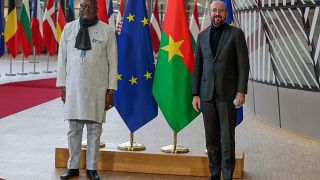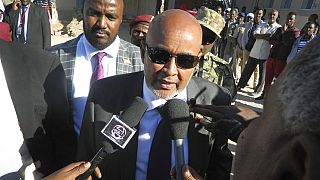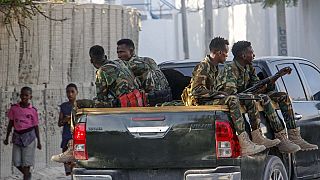Somalia
The U.N. Security Council called on Somalia’s federal government and regional states Tuesday to urgently resume talks and agree on arrangements to hold elections as soon as possible.
A September agreement allows for the president and others to stay in office after Monday’s election date if needed, but United Nations special representative James Swan has warned that going beyond that day brings “an unpredictable political situation in a country where we certainly don’t need any more of that.”
After a closed virtual briefing by Swan, council members issued a statement welcoming efforts by leaders of the government and regional states to find agreement on implementing the September deal but also expressing concern that talks ended without agreement Saturday.
“The members of the Security Council called for Somalia’s leaders to resume their dialogue urgently and work together, in the interests of the people of Somalia, to reach consensus on the arrangements for the conduct of inclusive elections with a view to holding them as soon as possible,” the council statement said.
It noted the announcement of further talks on February 15.
Somali President Mohamed Abdullahi Mohamed, who is seeking a second four-year term, blamed unnamed “foreign interventions” Saturday for the failure of the talks and accused Puntland and Jubbaland states of refusing to support the September agreement.
Power vacuum
Lawmakers in parliament booed the president, pounding their desktops, as he addressed them after days of discussions fizzled.
The president’s critics accuse him of delaying to extend his current mandate.
Mohamed said: “There’s still some hope that we can move forward, we just need to set another time for a meeting to solve our problems, and all these issues rest on the shoulders of parliament.”
Uncertainty over the election is ripe for exploitation by the Somalia-based al-Shabab extremist group, which has threatened to attack the polls. Last Friday, it launched a documentary series criticizing the president and the electoral process, which it accused of being riddled with corruption.
Al-Shabab attacked the city hosting the election talks on the night the president arrived and the following night. No one in town was killed, but security forces on the second night killed four attackers and detained two.
AP











01:30
Gaza war: What's next after new US veto on ceasefire draft resolution?
Go to video
US vetoes UN resolution demanding a cease-fire in Gaza for 4th time
01:08
Mozambique: Opposition leader Venancio Mondlane faces legal action
02:09
Russia vetoes UN resolution calling for immediate cease-fire in Sudan
01:07
Sudan keeps key aid crossing from Chad open to keep humanitarian aid flowing
01:00
Somaliland counts votes after pivotal election